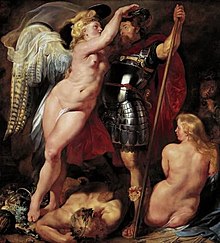מאצ'ואיזם
מראה

מאצ'ואיזם או היפר-גבריות הוא גבריות מופגנת.[1][2][3] מאצ'ואיסטים מזוהים בכך שהם דומיננטיים, תוקפניים ומטפחים את עצמם באופן חזק ועקבי. המאצ'ואיזם מושרש עמוק בתרבות הפופולרית, בעיקר במדינות דוברות ספרדית ופורטוגזית.
הגדרות
[עריכת קוד מקור | עריכה]המאפיינים של המאצ'ואיזם דומים למאפיינים של הגאוצ'ו. המאצ'ואיזם מבוסס על תכונות או התנהגויות ביולוגיות, היסטוריות, תרבותיות, פסיכו-חברתיות ובין-אישיות. המאפיינים של המאצ'ואיזם הם:
- יציבה – תנוחת גוף מסוימת יוצאת דופן או מוגזמת. הם מיישבים כל מחלוקת באמצעות אלימות מילולית או פיזית, בניגוד לדיפלומטיה.[4]
- הֶעָזָה – התרברבות שערורייתית, ביטחון עצמי מופרז.
- דומיננטיות חברתית
- יכולת מינית אסרטיבית.[5]
- הגנה על הכבוד למרות כל הסיכונים.
- נכונות להתמודד עם סכנה.[6]
מנקודת מבט תרבותית ופסיכולוגית מקסיקנית, ניתן לסכם את התכונות הפסיכו-חברתיות כחוסר פגיעות רגשית, דומיננטיות פטריארכלית, תגובות תוקפניות או בעלות גירויים, ואמביוולנטיות כלפי נשים.[7][8][9][10]
ראו גם
[עריכת קוד מקור | עריכה]- מדרג חברתי (בעלי חיים)
- אישה נשית
- אנדרוצנטריות
- שוביניזם
- מיזוגניה
- פטריארכיה
- גבריות
- גבריות רעילה
- אפליה מינית
- פמיניזם רדיקלי
קישורים חיצוניים
[עריכת קוד מקור | עריכה]- מאצ'ואיזם, באתר אנציקלופדיה בריטניקה (באנגלית)
הערות שוליים
[עריכת קוד מקור | עריכה]- ^ Machismo. (אורכב 24.12.2013 בארכיון Wayback Machine) Merriam-Webster Dictionary. Retrieved 1 February 2017.
- ^ Machismo. (אורכב 24.12.2013 בארכיון Wayback Machine) The Merriam-Webster's Concise Encyclopedia. Retrieved 1 February 2017.
- ^ Morales, Edward. S. Gender roles among Latino gay and bisexual men: Implications for family and couple relationships. In, J. Laird & R. J. Green (Eds.), Lesbians and gays in couples and families: A handbook for therapists. pp. 272-297. San Francisco: Jossey-Bass. 1996. Retrieved 23 December 2013.
- ^ "Latin America Machismo". family.jrank.org. אורכב מ-המקור ב-30 ביוני 2019. נבדק ב-30 ביוני 2019.
{{cite web}}: (עזרה) - ^ Sotelo, Pierrette Hondagneu-. (1994). Gendered Transitions: Mexican Experiences of Immigration. California: United States: Berkeley, Calif: University of California Press. ISBN 9780520075146. אורכב מ-המקור ב-17 באוקטובר 2021. נבדק ב-1 ביולי 2019.
{{cite book}}: (עזרה) - ^ Barker, Loewenstein, Gare, Irene. (1997). "Where the Boys are: Attitudes Related to Masculinity, Fatherhood, and Violence Toward Women among Low-Income Adolescent and Young Adult Males in Rio de Janeiro, Brazil". Youth & Society. 29 (2): 171. doi:10.1177/0044118X97029002002.
- ^ Kulis, Marsiglia, Hecht, Stephen, Flavio Francisco., Michael L. (2002). "Gender labels and gender identity as predictors of drug use among ethically diverse middle school students". Youth and Society. 33 (3): 442–475. doi:10.1177/0044118X02033003005. PMC 3045088. PMID 21359134.
{{cite journal}}: תחזוקה - ציטוט: multiple names: authors list (link) - ^ Marsiglia, Holleran, Flavio Francisco, Lori (1999). "I've learned so much from my mother: An ethnography of a group of Chicana high school students". Social Work in Education. 21 (4): 220–237. doi:10.1093/cs/21.4.220. אורכב מ-המקור ב-17 באוקטובר 2021. נבדק ב-30 ביוני 2019.
{{cite journal}}: (עזרה) - ^ Hardin, Michael (בינואר 2002). "Altering Masculinities: The Spanish Conquest and the Evolution of the Latin American Machismo" (PDF). International Journal of Sexuality and Gender Studies. 7 (1): 1–22. doi:10.1023/A:1013050829597. אורכב מ-המקור (PDF) ב-9 באוגוסט 2017. נבדק ב-30 ביוני 2019.
{{cite journal}}: (עזרה) - ^ Murekian, Octavio (28 במאי 2018). "International Body Image and the Issues with Purely Quantitative Marketing Research". www.toucaninsights.com. אורכב מ-המקור ב-30 ביוני 2019. נבדק ב-30 ביוני 2019.
{{cite web}}: (עזרה)
